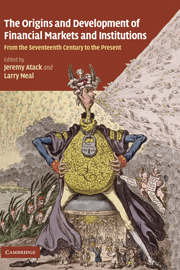 The Origins and Development of Financial Markets and Institutions
The Origins and Development of Financial Markets and Institutions Published online by Cambridge University Press: 04 August 2010
The early Dutch Republic experienced a monetary problem called incremental debasement, for mints repeatedly reduced the precious metal content of coins by small amounts. Adam Smith termed this the “small-state” problem because small, open economies often made substantial use of foreign coins, so debased foreign mints flowed into ports like Amsterdam. Around 1600, The Dutch Republic was awash in foreign coins and these were widely used as media of exchange. The fragmented nature of minting authority within the Dutch Republic meant that debasement had a domestic component as well. Whether foreign or domestic, a debasement led to uncertainty in the value of payments, creating transaction costs that hampered commerce.
The Dutch authorities attempted to deal with this debasement problem through laws and regulations, but these were often slow and ineffective. It took decades, for example, for the Republic to establish full control over its numerous independent mints. By contrast, laws assigning coin values were enacted early and often, but these did not solve the problem of debasement. While these were intended to simplify the use of coins by giving them a known value (tale) in terms of a unit of account, we argue that these laws, called mint ordinances, had the unintended consequence of making the situation worse. The disconnect between legal and intrinsic value encouraged people to bring old coins with high intrinsic, but low legal value to the mint in order to repay their debts with newly debased coins.
To save this book to your Kindle, first ensure [email protected] is added to your Approved Personal Document E-mail List under your Personal Document Settings on the Manage Your Content and Devices page of your Amazon account. Then enter the ‘name’ part of your Kindle email address below. Find out more about saving to your Kindle.
Note you can select to save to either the @free.kindle.com or @kindle.com variations. ‘@free.kindle.com’ emails are free but can only be saved to your device when it is connected to wi-fi. ‘@kindle.com’ emails can be delivered even when you are not connected to wi-fi, but note that service fees apply.
Find out more about the Kindle Personal Document Service.
To save content items to your account, please confirm that you agree to abide by our usage policies. If this is the first time you use this feature, you will be asked to authorise Cambridge Core to connect with your account. Find out more about saving content to Dropbox.
To save content items to your account, please confirm that you agree to abide by our usage policies. If this is the first time you use this feature, you will be asked to authorise Cambridge Core to connect with your account. Find out more about saving content to Google Drive.